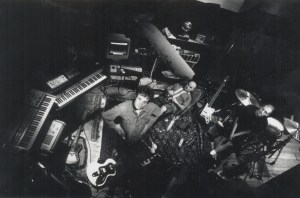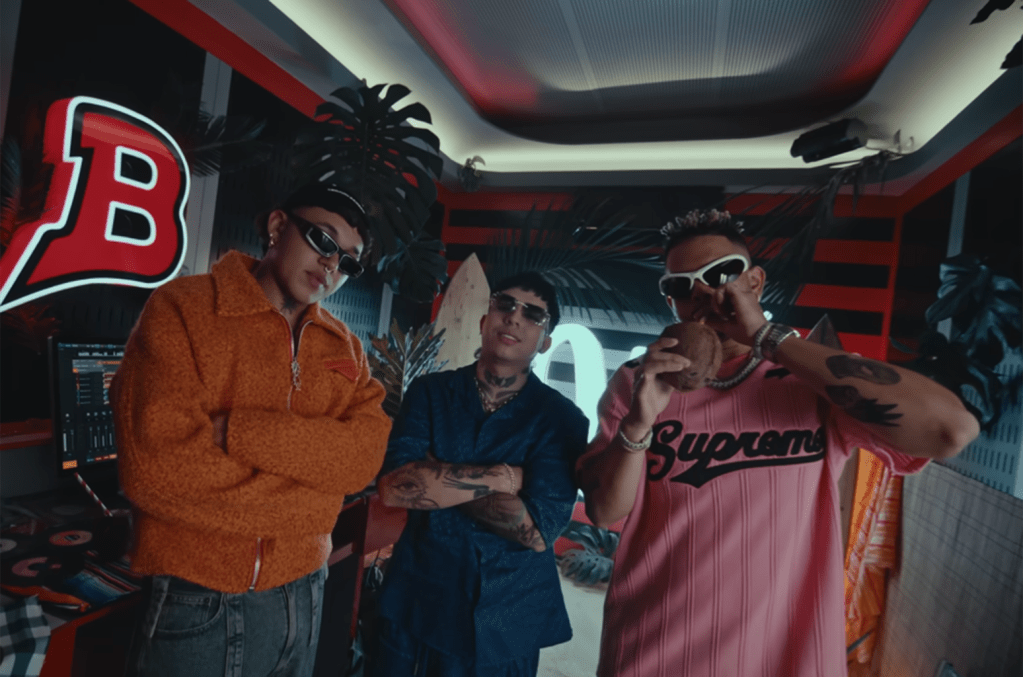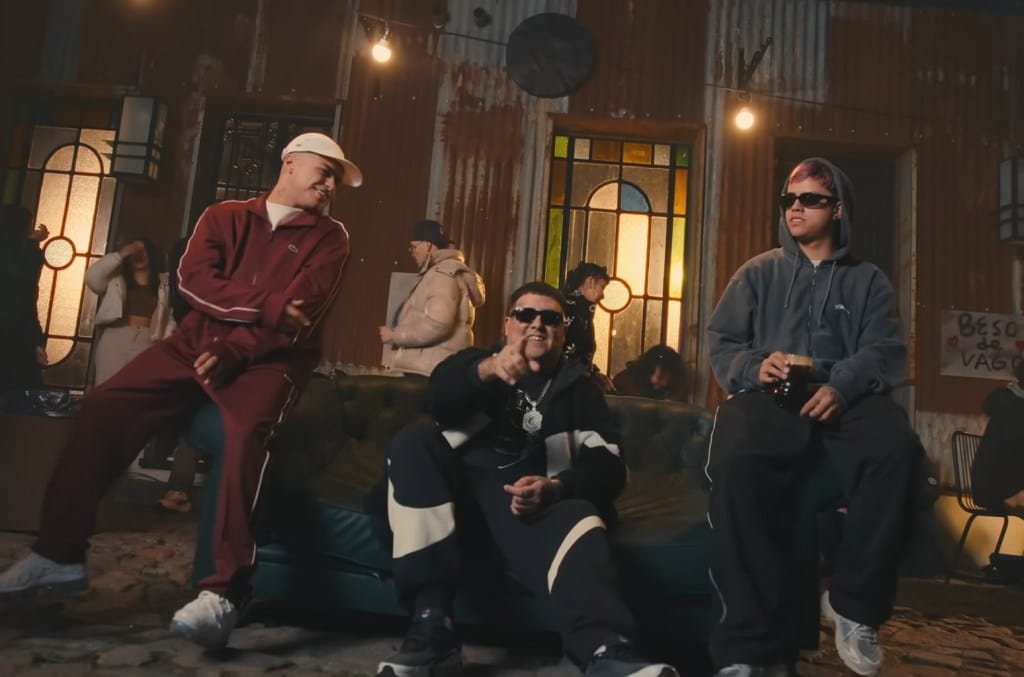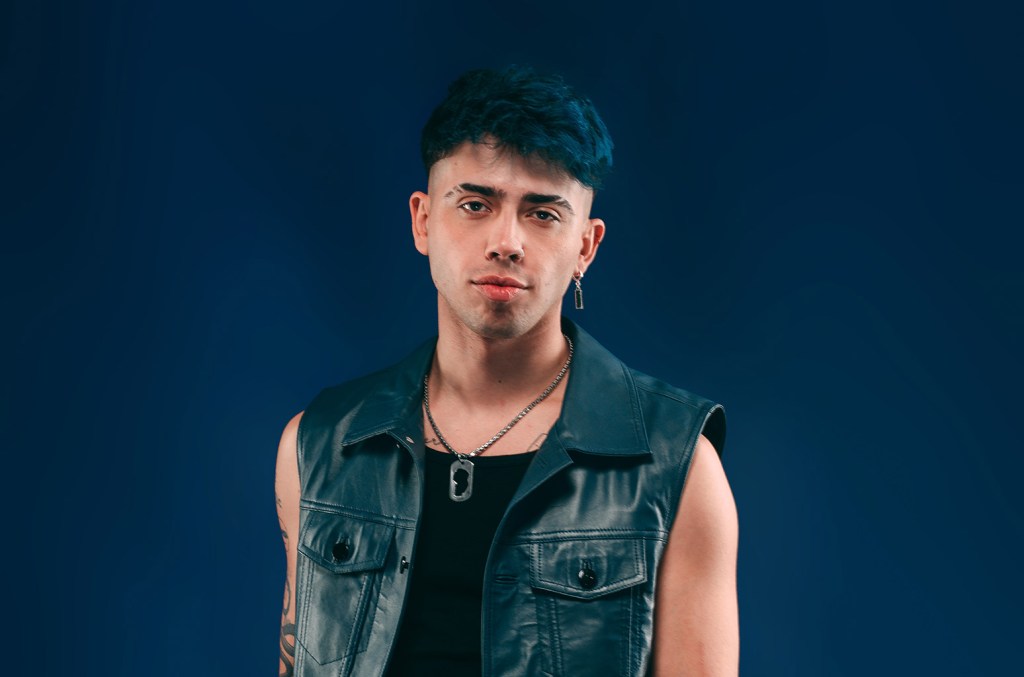Argentina

In 1995, the Argentine rock trio Soda Stereo returned to the studio after a three-year hiatus to record a brand-new album, Sueño Stereo (Stereo Dream), its seventh and final project. At the time, no one knew this would be the band’s farewell record. Its predecessor, Dynamo, was its most experimental and eclectic work, showcasing a complete turnaround of its new wave style over the previous decade. Sueño Stereo continued this exploration — an alternative album with a noticeable British influence, full of electronic sounds and violins, cellos and violas on many tracks.
The 1990s brought a completely different flow from the ’80s new wave that made Soda Stereo famous. As the alternative rock movement gained popularity in the U.S. and Europe, listeners also increased in Latin America, and Soda Stereo embraced it and made the genre its own. After 10 years of working nonstop, releasing album after album and touring Latin America, the band decided to experiment and created an utterly progressive rock album that fans and other artists still praise 30 years later.
Trending on Billboard
“Latin American rock DNA is partly based on a tremendous sense of inferiority because it always copied everything that was happening in England and the United States,” Ernesto Lechner, a music journalist from Argentina who has lived in the U.S. since the 1990s, tells Billboard. “Soda Stereo changed that.”
Soda Stereo revolutionized Latin rock history with their new sounds and exploration of diverse musical genres. That style would become the stamp of the lead singer Gustavo Cerati’s artistry, which he would perfect in his first solo album, Bocanada (1999), after Soda Stereo disbanded in 1997. Sueño Stereo, released on June 21, 1995, became the band’s magnum opus.
“Sueño Stereo, for me is, without a doubt, without discussion, Soda’s best album,” Lechner adds. “It’s a glorious record. A psychedelic rock album — electronic rock with moments of ambient music, a very sophisticated thing. It was like a full circle.”
“Is like the final masterpiece, very refined and perfect,” Valeria Agis, editor of Argentine newspaper La Nación, tells Billboard of the set, which in 2012 was ranked fourth by Rolling Stone in its 10 greatest Latin rock albums of all time.
Sueño Stereo’s journey begins with the alternative rock of “Ella Usó Mi Cabeza Como un Revólver,” a melancholy, complex track that presented a string arrangement of viola, violin and cello. A significant change also came with “Disco Eterno” and “Zoom,” two neo-psychedelic pop-rock songs on the set that became classics in the band’s repertoire.
Further into the album, The Beatles’ influence became apparent with the Britpop tracks “Paseando Por Roma” and “Ojo de la Tormenta.” The set concludes with a surprising shift in the last three songs, instrumentals in which the psychedelic sounds mash up with electronic ones.
For Soda’s bassist Zeta Bosio, it was the album that allowed him to keep going. A year before the release, his 2-year-old son Tobías had died in a car accident. “That was the album that brought me back to life a little, back to reality,” he tells Billboard. But it was also the album that brought the band back together as a family, allowing them to “become an organism where we could feel what the other was going to do.”
Drummer Charly Alberti felt it too. The album “presents us already at a really high musical level, the three of us,” he adds. “Things would come together really organically.”
Soda Stereo
Cecilia Amenábar
Within 15 days of its release, Sueño Stereo went platinum, making it an instant hit in Argentina and all over Latin America. Still, two years later, the band decided to end its 15-year journey together with the farewell tour El Último Concierto (The Last Concert), which culminated in a final show at the Estadio Monumental in Buenos Aires — a performance that left us not only with the live album and DVD of the same name, but also with Cerati’s iconic phrase “Gracias totales” (which literally means “total thanks” but does not translate perfectly into English).
Cerati took the time to focus on his personal projects. In 1999 he released Bocanada, the album he considered his official solo debut, although he had previously released two sets during Soda Stereo’s hiatus before Sueño Stereo. In this context, Bocanada, which means breath or puff, is used metaphorically to symbolize a “new breath of creativity,” as Cerati noted that the songs were coming to him very easily.
In 2007, Soda Stereo reunited for the Me Verás Volver Tour (You Will See Me Return), which took them all over Latin America and some U.S. states, including Florida and California. The trek began and finished at River Plate, Buenos Aires’ biggest stadium with a capacity of 70,000, where they performed six sold-out nights — five more than in 1997.
Soda Stereo was planning a few additional shows, even one in Spain, a market they never got to conquer. According to Bosio, the doors were open to doing more with the band. “The music was still intact. It was like we were entering a new stage of maturity and starting to understand things in a different way,” he says. “[But] being Soda Stereo always came with a lot of pressure. Especially for Gustavo, who was the main songwriter.”
In 2010, Cerati suffered a stroke after finishing a concert in Caracas, Venezuela, while promoting his last solo album, Fuerza Natural. He remained in a coma until his death on Sept. 4, 2014, at the age of 55.
But it was Sueño Stereo that prepared the ground for what came later. Sueño Stereo didn’t mark the end; it was the beginning of a new sound that still echoes 30 years later.
“One of our goals for this album was to take a subtractive approach,” said Cerati, as quoted in the book Cerati en Primera Persona (Cerati in First Person) by Maitena Aboitiz. “It was like saying: ‘Let’s pull back a bit’ — not to keep a low profile, but because we didn’t need to repeat the same thing over and over.”
Solo, Cerati had the freedom to do whatever he wanted, in his own words. With Soda, the exploration that began with Dynamo and that the band perfected with Sueño Stereo reached its highest point. The outcome was one of their most important pieces and one of rock’s greatest bodies of work, influencing artists all over Latin America and the world for years to come.
The 2025 Argentina Music Report from the Argentine Chamber of Phonogram and Videogram Producers (CAPIF) shows that streaming is still dominating the country’s music industry, making up 79% of total recorded music revenue in 2024.
Within the digital segment, subscription-based streaming leads with 65% of the revenue, solidifying itself as the main source of music monetization in Argentina. Meanwhile, ad-supported streaming accounted for 35% of the total.
“For the first time since emerging from the post-pandemic crisis, the numbers in our industry show a decline in 2024 compared to the previous year,” says CAPIF president Diego Zapico in the annual report shared with Billboard Español. “The causes are varied: they range from the macroeconomic reality of our country to specific factors within our sector that had been accumulating imbalances and were exposed over the past year.”
“The market decline is explained by the fact that the value of service tariffs does not keep pace with the evolution of the economy and therefore, at constant values, service prices are relatively lower today,” a representative of CAPIF tells Billboard Español. “In addition, the drop in revenues from communication to the public attributable to decree 765/24, published in the Official Gazette on August 28, 2024, which modified the intellectual property regime in Argentina, particularly with respect to the public performance of musical works, has also had an impact.”
Additionally, physical sales — though declining — still made up 7% of the market, with vinyl records solidifying their spot as collectors’ favorite format, accounting for 69% of physical sales compared to 31% for CDs.
“Our country is an endless source of talent, with an incredible diversity of styles, genres, and music,” adds Zapico. “It’s a place where creativity flows freely, where artists collaborate across boundaries, and where languages and sounds constantly mix, fuse, invent and reinvent themselves.”
The report also highlights the impact of Latin artists in the top 10 of the 2024 General Ranking. Among the most popular tracks are “Hola Perdida” by Luck Ra and KHEA, “Piel” by Tiago PZK and Ke Personajes, and “Que Me Falte Todo” by Luck Ra and Abel Pintos. Other hits, like “Una Foto” by Mesita, Nicki Nicole, Tiago PZK and Emilia, as well as “La_Original.mp3” by Emilia and Tini, showcase the reach of Argentine music in both the local and regional markets.
“This is our unique national identity when it comes to art and music, and it’s what drives the success of many of our artists around the world,” says Zapico. “From the legends and established stars to the newcomers who emerge year after year, their strong presence at the top of global and regional charts and scenes stems from this.”
Check out the full top 10 of the 2024 General Ranking below:
Luck Ra y KHEA, “Hola Perdida”
Tiago PZK y Ke Personajes, “Piel”
Luck Ra y Abel Pintos, “Que Me Falte Todo”
Feid y ATL Jacob, “Luna”
Mesita, Nicki Nicole, Tiago PZK y Emilia, “Una Foto”
Los Ángeles Azules y Emilia, “Perdonarte, ¿Para Qué?”
Emilia y Tini, “La_Original.mp3″
Floyymenor y Cris MJ, “Gata Only”
Luck Ra y BM, “La Morocha”
Salastkbron y Diego París, “Un Besito Más”
On the other hand, “Luna” by Feid and ATL Jacob leads the top 10 of the Spanish-Language Foreign Artists Repertoire; while Benson Boone leads the top 10 of the Foreign Artists Repertoire in Other Languages ranking.
To see the full annual charts, click here.
Maria Becerra, Paulo Londra and XRoss’ “Ramen Para Dos” leads the Billboard Argentina Hot 100 chart for a second week on the chart dated (May 31). Two weeks ago, when the song debuted at No. 1, it became producer XRoss’ first champ and entry since the tally began in 2018. Explore See latest videos, charts […]

W Sound, Beéle and Ovy on the Drums celebrate a new milestone on the Billboard Argentina Hot 100 chart, as “La Plena (W Sound 05)” jumps 2-1 for its first week atop the ranking dated May 17. To date, Beéle has earned a total of three top 10s, while Ovy on the Drums has placed two. Meanwhile, W Sound — also known as Westcol — secured his first top 10 entry when the song climbed 14-8 in April.
“La Plena (W Sound 05)” dethrones Cazzu’s “Con Otra,” which dips 1-2, while Emilia, TINI and Nicki Nicole’s “Blackout” holds at No. 3 for a third week following its two-week coronation in April. Bad Bunny rebounds to No. 6 after sitting in the runner-up slot for two weeks in March.Elsewhere, Puerto Rican singer Mattei earns his first top 10 with “Pa’ Las Girlas,” which surges from No. 26 to No. 9 in its third week on the tally.
Trending on Billboard
The week’s Hot Shot Debut goes to Lali’s “Plástico,” with Duki, which starts at No. 25. The argentinian singer also debuts a second song from her album, No Vayas A Atender Cuando El Demonio Llama, as “Lokura” arrives at No. 81. Four other cuts from the album chart this week, starting with “Mejor Que Vos,” with Miranda!, at No. 14, “33,” with Dillom, which pushes 29-38, and “No Me Importa” and “Fanátco,” which re-enter at Nos. 75 and 90, respectively. Plus, “Loco Un Poco,” with Turf, ascends 88-77, for Lali’s seventh concurrent songs on the chart, the most this week.
Yan Block & Panda Black’s “444” takes the Greatest Gainer honor, awarded weekly to the song with the largest ascent among the 100 titles on the chart. The single climbs 21 spots, from No.100 to No.79, for its new peak.
Two other songs debut on the Billboard Argentina Hot 100: Salastkabron’s “Tengo Una Cadena” at No. 26, while Young Miko’s “WASSUP” bows at No. 70.
Cazzu leads the Billboard Argentina Hot 100 chart for a second consecutive week as “Con Otra” holds steady at No. 1 on the chart dated May 3. The song, released on DALE Play March 19, has remained strong in the chart’s top 10 since its debut at No. 2 (April 5 dated list).
In addition to her recent leader, the Argentinian previously reached a No. 5 high through her Maria Becerra collab, “Animal,” in 2021.
Trending on Billboard
W Sound, better known as Westcol, Béele and Ovy On The Drums nearly miss the top slot as “W Sound 05: La Plena,” rises 4-2, marking the acts’ highest entry to date. Meanwhile, Emilia, TINI, and Nicki Nicole’s “Blackout” dips 2-3, after topping the ranking for two consecutive weeks in April. Emilia also places another top 10 track on the Billboard Argentina Hot 100: “Bunda,” with Luísa Sonza, which slips 7-8.
Back in the top five, La T y La M’s “Amor De Vago,” featuring Malandro de América, falls 4-3. Alleh and Yorghaki’s “Capaz” holds at No. 5 for a second week, for its eighth week in the upper region during its 13th week run so far.
Karol G’s “Si Antes Te Hubiera Conocido” adds a fourth week at No. 6, after the song dominated for 16 consecutive weeks between 2024-25. Plus, Bad Bunny’s “Baile Inolvidable” jumps 8-7, following two consecutive weeks in the runner-up slot in March.
Ecuadorian Jombriel closes the top 10 with two entries. “Parte & Choke,” with Ryan Castro, Jotta and Alex Krack, holds at No. 9 for the third consecutive week, after it ruled for one week in March. Plus, Jombriel’s most recent single, “Vitamina,” with DFZM, breaks into the top 10, climbing 15-10. The move gives Jombriel his second top 10, while Colombian DFZM earns his first.
The week’s Greatest Gainer honors goes to Pablo Chill-E, whose single “Resentía” leaps 28 positions, surging from No. 49 to No. 21.
Elsewhere, Mattei’s “Pa Las Girlas” becomes the Hot Shot Debut of the week, entering at No. 50.
Lastly, Tobal MJ and Lucky Brown’s “Tiene” opens at No. 78, while rock band Estelares add its third entry with “Ella Dijo” at No. 91. It’s the group’s first appearance in over two years, following “Encantan,” featuring Enjambre, in 2022.

In today’s mainstream Latin music landscape — a space often dominated by música urbana, tropical rhythms, and regional Mexican music — CA7RIEL & Paco Amoroso have carved a lane entirely their own. Armed with flamboyant charisma, virtuosic musicality, and a penchant for genre-defying audacity, the Argentine duo represent a new wave of artistry that refuses to fit neatly into any box. At a time when the mainstream clamors for familiarity, they bring chaos and innovation to the table, pushing the boundaries of what Latin music can sound like.
Explore
Explore
See latest videos, charts and news
See latest videos, charts and news
Their meteoric rise is nothing short of groundbreaking. Last week, the pair performed two back-to-back sold-out shows at New York’s Bowery Ballroom — as part of their wildly ambitious 60-date world tour, which includes stops in global festivals like Coachella (U.S.), Fuji Rock (Japan), Glastonbury (England), Roskilde (Denmark), and Lollapalooza (Berlin, Paris). Just weeks earlier, the duo made their debut on The Tonight Show Starring Jimmy Fallon, a rare feat for Argentine artists, and a testament to their growing influence on the global stage.
Trending on Billboard
But for them, fame doesn’t come without complication — a sentiment captured in their latest EP Papota and its opening track, “Impostor.” The song serves as a brutally humorous and raw meditation on their skyrocketing success, grappling with the absurd pressure of becoming icons seemingly overnight. The Tiny Desk concert that launched them to international acclaim six months ago — now one of the most-viewed performances on the channel by a Spanish-language artist, with 33.5 million views — serves both as a badge of honor and a symbol of what they jokingly call “síndrome de impostor” (imposter syndrome) on the aforementioned song.
“Coming all the way from el culo del mundo (the ass of the world), we didn’t expect this,” CA7RIEL tells Billboard Español backstage at the Bowery, referencing their South American roots. “To suddenly appear here, with all these cameras and lights — it’s insane. We’re from way down there; we’re still adjusting to being up here.” Yet their poised combination of rock star energy and mayhem proves they’re more than ready.
CA7RIEL & Paco Amoroso
Toto Pons
Their chemistry isn’t just professional — it’s personal. The duo met when they were just six years old, drawn together by matching surnames (Guerreiro and Guerriero) and the mistaken assumption by their teacher that they were brothers. That fateful connection would snowball into a lifelong friendship and artistic partnership that thrives on curiosity, trust and unabashed eccentricity.
Raised in Buenos Aires, their musical influences stem from both the streets and their homes. CA7RIEL grew up watching his father play guitar, and today he’s an impeccable guitarist who plays jazzy, progressive riffs on his Fender. “I wanted to be Michael Jackson. I wanted to be Queen — the whole band,” he admits. Paco Amoroso, meanwhile, was hooked on pirated compilations of the Argentine rock icons, like Patricio Rey y sus Redonditos de Ricota, whose legacy courses through their veins. “For years it was the only thing I listened to, those 18 tracks,” Paco recalls. He adds, “Argentine rock is more like a way of life, I feel. You wanted to be like those guys, we didn’t want to go to work. We wanted to be drinking champagne. And when you’re a kid, you want that.” He also references the Dutch violinist André Rieu: “I wanted to play the violin, he is a total master.”
Their early inspirations laid the foundation for their ability to mix genres and embrace experimentation. “We go through different phases,” Paco explains, “vicios diferentes” (different vices). “At one point, it was all about rapping, then playing instruments, which was how we started. We even had a phase where we just gamed all the time and did nothing else. Then you keep evolving,” he adds. The duo’s knack for innovation — mixing intricate jazz chords, gospel-style vocals, live instrumentation and electronic rhythms, as they masterfully demonstrated that night at the Bowery — has made them boundary-pushers in their own right.
Though CA7RIEL & Paco Amoroso rose to prominence as a duo, their journey has also been defined by daring forays into solo territory. After their breakthrough collaboration on tracks like 2019’s “Ouke” and “Mi Sombra,” both artists paused their partnership to venture into their individual projects. CA7RIEL’s solo debut featured two EPs before evolving into the eclectic El Disko, a 2022 Latin Grammy-nominated album that fused funky grooves, old-school hip-hop, glowing synths, and lo-fi minimalism. For his part, Paco Amoroso explored bold sonic textures in his brooding 2021 album Saeta, further pushing the boundaries of Argentinian trap and electronic music.
Despite their time apart, their connection remained intact, culminating in a magnetic reunion for 2024’s Baño María and their latest EP, Papota. The new era finds them reuniting as friends and collaborators, carrying with them the richness of their individual experiences and a renewed creative spark.
Their Tiny Desk performance — previously mentioned in connection to the introspection of “Impostor” — stands as a pivotal moment, showcasing their identity as sons of Buenos Aires and bringing their unorthodox artistry to the global stage. The performance became one of the series’ most successful videos, reaching numbers comparable to Latin icons like Natalia Lafourcade’s seven-year-old set, all while introducing viewers to the raw complexity of their sound.
CA7RIEL & Paco Amoroso perform at Bowery Ballroom in New York on April 23, 2025.
Toto Pons
Their taboo-breaking flamboyance — including playful moments on stage, sometimes even kissing each other on screen as a symbol of their camaraderie — adds a theatrical flair to their shows that captivates. It’s this kind of unorthodox, boundary-defying presence that makes them not just stars but leaders of Latin music’s avant-garde.
No moment encapsulated this better than their closing number, where CA7RIEL & Paco Amoroso invited audience interaction, holding out their microphones for fans to belt out the lyrics. “Interacción total,” CA7RIEL called it.
When asked what lies ahead, the duo keeps it grounded, “Seguir estando vivos” — just staying alive. Paco elaborates with a laugh: “For some people, that’s easy. For others, not so much.” It’s an ethos reflective of their unfiltered approach to music. With every new song, stage and daring experiment, they’re proving that their bold vision isn’t just about breaking boundaries — it’s about living fully through the music they create.
Name: Catriel and Ulises
Age: Both 31
Recommended Song: Paco recommends “El Día del Amigo” because “it speaks about friendship” and showcases the essence of their project. CA7RIEL, on the other hand, picks “Mi Sombra,” a track he describes as “something that stayed in the bottom of the drawer,” which makes it an unexpected favorite for him.
Biggest Accomplishment: Both agree on one simple yet deep accomplishment: “Being born and not yet dead,” they say with a wry chuckle.
What’s Next: “Lots of touring,” they reply in the midst of their 60-date tour, which includes stops in the United States, Latin America, Europe and Asia, as well as performances at international festivals like Coachella, Glastonbury, Lollapalooza and Fuji Rock.
La T y La M extend their reign on the Billboard Argentina Hot 100 to a 12th consecutive week as “Amor De Vago,” featuring Malandro de América, holds steady at No. 1 on the chart dated April 4.
Explore
Explore
See latest videos, charts and news
See latest videos, charts and news
With this milestone, the track ties with Maluma and The Weeknd’s “Hawái” for the fifth-longest reign of the decade. Above it are two Karol G hits: the record-breaking 25-week leader “Tusa” with Nicki Minaj (2020) and “Si Antes Te Hubiera Conocido” (2024–25). The latter ties at 16 weeks atop with Tiago PZK, Lit Killah, Nicki Nicole, and Maria Becerra’s “Entre Nosotros” (2021–22). Also ahead is Manuel Turizo’s “La Bachata,” which led for 15 weeks in 2022.
Cazzu takes the runner-up slot with her latest single, “Con Otra,” which starts at No. 2. In addition to being this week’s Hot Shot Debut, the song earns the Argentinian her highest entry among 18 career entries. Previously, “Animal,” with Maria Becerra, reached No. 5 high in 2021.
Trending on Billboard
Yami Safdie and Lasso’s “En Otra Vida” rebounds to the top 10, climbing 13-9, after the song peaked at No. 6 last December.
Emilia, TINI and Nicki Nicole add a new song to their extensive Billboard Argentina Hot 100 ledger with their first three-way collab “Blackout,” which arrives at No. 27.
Teddy Swims earns the Greatest Gainer honors of the week as “Lose Control” climbs 49 rankings, from No. 86 to No. 37. The singer-songwriter also adds a new song on the tally, “The Door” at No. 40.
Four other songs debut this week, starting with Q`Lokura and Los Herrera’s “Carita Triste” at No. 80, KHEA, DUKI and La Joaqui’s “Mi Señora” at No. 88, Elena Rose and Morat’s “Un Beso Menos” at No. 95, and Airbag’s “Cae El Sol” at No. 97.
A court in Argentina dropped charges of criminal negligence against three of the five people indicted in connection with the death of Liam Payne, the former One Direction singer who fell from a third-floor hotel balcony in Buenos Aires last October, according to a ruling obtained by The Associated Press.
A preliminary autopsy report cited multiple traumas and hemorrhages as the cause of death, while a toxicology report revealed alcohol, cocaine, and prescription antidepressants in Payne’s system.
Trending on Billboard
The court cleared Esteban Grassi, head receptionist at the CasaSur Hotel, Rogelio Nores, an Argentine-American businessman who accompanied Payne on the trip, and Gilda Martin, the hotel’s manager. Grassi had made two emergency calls prior to the accident, first reporting that a guest was “trashing the entire room” and later expressing concerns that the guest “may be in danger.”
Prosecutors argued that Nores neglected his duty of care by leaving Payne alone while intoxicated, but the court ruled that he had no legal obligation. Martin and Grassi, who had escorted Payne to his room, were also cleared, as the court found insufficient evidence that their actions directly contributed to his fatal fall.
However, two other defendants, Ezequiel David Pereyra, a former hotel employee, and Braian Paiz, a waiter who served Payne at a restaurant, remain in custody. They are charged with supplying narcotics to Payne, an offense that carries a prison sentence of four to 15 years in Argentina. The court justified their continued detention due to the severity of the charges.
In Argentina’s legal system, prosecutors gather evidence for a judge to decide whether a case proceeds to trial.
Payne was laid to rest in November in the U.K., with his funeral attended by his One Direction bandmates, girlfriend Katie Cassidy, and ex-partner Cheryl Cole, with whom he shared a son.
Warner Music Group announced changes to its division overseeing Argentina and Chile on Tuesday (Feb. 11), bringing in Tomás Talarico as the new managing director of Warner Music Southern Cone (née Cono Sur), effective immediately. He succeeds Guillermo Castellani, who will stay on as a consultant during the transition. Talarico will report to Alejandro Duque, president of Warner Music Latin America.
Talarico brings extensive industry experience, having founded MOJO, an independent record label and digital distributor, in 2014. Under his leadership, MOJO expanded across Argentina, Chile and Peru, becoming a key player in the tropical and urban music markets. The company has collaborated with approximately 150 artists and labels, managing audiovisual production and music publishing. According to the hiring announcement, MOJO’s success includes more than 50 Gold and Platinum certified singles and multiple industry awards, including eight Gardel Awards and two Pulsar Awards.
Throughout his career, Talarico has played a significant role in developing emerging artists such as ECKO, Grupo Zumbale Primo, Kaleb Di Masi, Papichamp and Uriel Lozano, among others. He was also a key contributor to the collaborative project Un Poco de Ruido. He’s also a musician, having released five rock and pop albums as a guitarist and singer-songwriter.
Trending on Billboard
Before founding MOJO, Talarico was a pioneer in digital music distribution, working with companies focused on MP3 and ringtone sales. His early career included a role as a supervisor at Tower Records.
Duque praised Talarico’s entrepreneurial mindset and ability to bridge music and technology “to the service of artists,” also praising Castellani role in developing the careers of major Warner artists such as Maria Becerra and Tiago PZK.
Talarico expressed excitement about joining WMG, highlighting the opportunity to utilize the resources of an international label to support the region.
“To be able to tap into the resources of a major label to superserve the exceptional talent in this region is an incredible opportunity,” he said. “I also want to pay tribute to the remarkable Guillermo Castellani who has nurtured such a strong team and played a huge role in the wider music industry. He leaves big shoes to fill, and I’m looking forward to building on his legacy!”
Castellani reflected on his time at Warner Music, which dates back to early 2002, and lauded the support of Duque and the Warner Music Southern Cone team.
“I am grateful to the family of Warner Music Southern Cone for allowing me to enjoy my work every day: without them it would have been impossible to reach the goals we achieved,” he said. “I wish Tomás success in writing the following chapter in the Southern Cone. I am sure that he will lead Warner Music in its continuous growth so that it will remain a magnet for new music talent in this part of the world.”

Argentinians La T y La M and Malandro de America continue its domination on the Billboard Argentina Hot 100 chart, as “Amor De Vago” adds a third week at No. 1 (chart dated Jan. 25).
The song, released Aug. 23 through Zelaya Producciones/Grace Music, earned both artists their first champ when it jumped 2-1 on the tally (dated Jan. 11), three weeks ago. It also earned Malandro de America his first appearance to date.
Bad Bunny’s new album Debí Tirar Más Fotos, which debuted at No. 1 on the Top Latin Albums chart, yields new career records. In addition to activity stemming from 12 songs already on the chart, five others debut. “DtMF,” which leads this week’s multi-metric Hot Latin Songs chart, also leads the recruits, as it flies 62-3 with the Greats Gainer weekly honors.
Trending on Billboard
In sum, Benito places 18 songs on the chart, 17 from the Debí Tirar Más Fotos plus a collab with Rauw Alejandro, ““Qué Pasaría…,” at No. 23. With 18 simultaneous titles, he outdoes himself, and sets a new record for the most concurrent songs since the chart launched in 2018.
Here’s Bad Bunny’s collection of songs on the current chart:
No. 3, “DtMF”No. 6, “BAILE INoLVIDABLE”No. 9, “NUEVAYoL”No. 10, VOY A LLeVARTE PA PR”No. 12, “WELTiTA,” with ChuwiNo. 13, “VELDá,” with Omar Courtz & Dei VNo. 21, “EL CLúb”No. 22, “Qué Pasaría…,” with Rauw AlejandroNo. 25, KLOuFRENSNo. 29, PERFuMITO NUEVO,” with RaiNaoNo. 33, “EoO” (debuts)No. 39, “KETU TeCRÉ”No. 50, “TURISTA” (debuts)No. 52, “BOKeTe”No. 59, “PIToRRO DE COCO”No. 61, “CAFé CON RON,” with Los Pleneros De La Cresta (debuts)No. 65, “La MuDANZA” (debuts)No. 80, “LO QUE LE PASÓ a HAWAii” (debuts)
Two other songs bow this week, starting with Danny Ocean and Kapo’s “Imagínate” at No. 89, and Sebastián Yatra and Bad Gyal’s “2AM” at No. 95.

 State Champ Radio
State Champ Radio 




